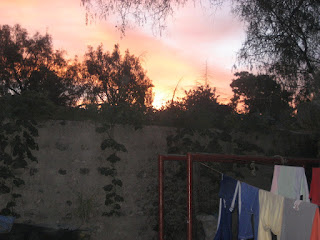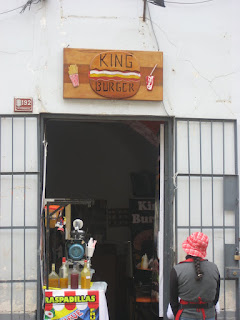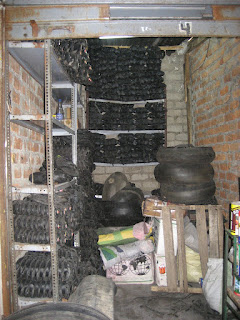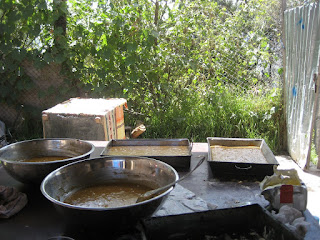Thursday, April 29, 2010
Pills and co.
As in the majority of places, the benches were filled with unwell kids and anxious parents. Oh, and the well siblings who had discovered the candy sold in the waiting room. Incongruity number one-- if you wanted a chocolate bar to assist your lengthy wait, just go up to the nurse with your coins. But she may be too busy watching the telenovela projected in their little office. That said, Pedro's moving ploy to win Francesca back was quite captivating.
The staff was actually extremely efficient and capable despite the seeming lack of order. I have an acute sinusitis, former stomach bug and skin rash from the dust here. As we're changing seasons, the nights are extremely dry and many other have fallen sick as well. I'm still not thumping with energy, but am casting my vote in a fix before I feel like I really won't have contributed any work here.
Overheard in Ayacucho
Lost in Translation
Erm, that would be niña.
Monday, April 26, 2010
Vocabulario
CHINO/A, CHINITO/A-- Chinese, or little Chinese. It doesn't matter if your ancestors hail from Japan or Indonesia, if you have a trace of Asia still visible, your nickname is predestined. The term definitely does not have the pejorative connotations that it has in many other languages.
Power of la pelota
On Friday, when strolling around Ayacucho, I spotted the panini sticker collection album for the World Cup 2010 on sale. I know, it's lame. But I bought it, and suddenly at least seven little kids came rushing down and asked if they could stick the photos in for me. Of course I let them-- but also teased them a little as Peru didn't qualify. It was truly hilarious as the swarm seemed to emerge out of nowhere.
Marketed prison
Tourist fever
Friday, April 23, 2010
Details of Ayacucho





Sunday animation in the center-- dancing to cumbia, of course.
Ubiquitous unit

Sunset above the kids' drying laundry.
Lost in Translation
pierna= leg.
piedra= rock
Of course, he moved his left rock up.
Would a shop by any other name sell as well?

His last name means shoemaker and he owns a shoe store. Sometimes life is too perfect.

King Burger? Wait, isn't it the other way- no. No, King Burger rules this city.

'Spa Top Model'. It's a very exclusive place.

'Pagamonedas' casino.

'Papal center 'John Paul II'. And what does it boast? A cellphone store. Confused.
Wednesday, April 21, 2010
Ode to community living
- There is a public pay phone tacked onto the wall on the street-side of my ground-floor bedroom. Wait, let me repeat that: there is an incessantly-used phone less than three metres from my bed. Every morning, I wake up to its charming ring. The typical suspect is a man who adores yelling in Quechua at 7 in the morning. Of course, he only has piles of 10 cent coins, so a lovely cling-cling chimes in to his Quechuan yells. Granted, I'm exaggerating a little-- but not much. I know half the neighborhood gossip thanks to the phone though, which is a definite perk.

Call me on my pay phone.
- We have a "family" meal every night at 8, on the large outside table under which our two dogs snooze. It's always at least quadrilingual, mostly amusing and often delicious.
- Washing my hair is now equivalent to seeing the world upside down. As the outside shower's water seems to emerge from invisible glaciers, I can't bear to shampoo my hair there. Therefore, the sink provides me with a welcome change of vision and a possibly helpful, possibly harmful backstretch.
Despite its incongruities, life in the casa is lively, welcoming and varied.
Lost in translation
Tengo hAmbre: I have hunger.
Tengo hOmbre: I have a man.
Frying up a Peruvian storm

Sopita for all.
Poor Peru. Any one who has ever been in a kitchen with me knows how dangerous that situation can be. My last encounter with my home microwave was a little too ablaze for its liking. I was making cookies but the butter was rockhard-- ergo why not zap it a few seconds to melt it a little? Turns out the aluminium foil covering said butter didn't respond too well... but the fire was small and easily extinguished. I miraculously avoided any major faux-pas in this restaurant. I did however spill a little chicha-- a sweet, corn-based, purple drink-- in the green soup. Thankfully the purple quickly dissolved and no complaints floated back to the kitchen. It was actually quite a tiring afternoon, as speed and efficiency are constantly required, but still quite fun.
Later, I and another volunteer were on duty to cook up a succulent dinner for the dozen other volunteers. As good Peruvians, we headed to the market to secure the fresh ingredients required-- namely avocado for my "specialty," guacamole. "Aguacate" was the word used for avocados in Ecuador, but got me nowhere here. We spent about 10 minutes trying to explain what vegetable we were seeking. I picked up eggplant to vaguely indicate the shape, kept pointing at lettuce for the colour... eventually half the women in the market had gathered in a kind attempt to guide us on our quest. And then, at last, in a corner: avocados! Or palta, as I now will never ever forget.

No avocadoes yet.
As you may have gathered, it was a day placed under the cooking Gods, which aided me in my so-far unaccomplished New Year's resolution of learning how to cook.
Tuesday, April 20, 2010
Tentative first day at the casa
Taking a side road towards Ayacucho to finally escape the tourist highway that Peru sometimes resembles was definitely a necessary step. But traipsing around gorgeous citadels wasn’t painful. Life in Ayacucho is far more real, although I of course still remain in a vastly more comfortable situation than the majority of people here.
My first day at the casa was messy, uncertain and of little impact. It’s termed a casa here, instead of an orphanage, as the majority of the 28 kids housed there still have family, albeit often estranged or incapable of caring for them. The children are divided in three groups—the little ones, the eldest and the handicapped. There is nearly the same number of señoritas, or caretakers, who seem to be constantly running after the rowdy kids.
As there are nearly ten volunteers rotating their time to be with the kids at all times, they have understandably become blasee about the coming-and-goings. Especially the brief interventions of the well-meaning travellers who sometimes don’t speak Spanish and only stay a few weeks. Every time I acknowledge that i am only staying a month, i feel the coolness of the organizers. I’m trying to find a meaningful project to contribute despite my lack of real skill or time.That said, i completely understand—when working with children who have a history of abandon, the constant shuffle of volunteers is not ideal.
I definitely spent a lot of time shuffling yesterday—energy is one characteristic the toddlers do not lack. From playing in the dirt to running after some of the chicken in the yard, they were adorable if at times difficult to handle. After my session, i discussed some of the children with the coordinator, who informed me of some of their deeply chilling pasts... Much remains to be navigated—from understanding the individual kids to exploring the peculiar hierarchy of the organization, and only hope to be able to contribute a grain.
VOCABULARIO
HIJO/A POLITICA—Literally one’s son or daughter, politically speaking. Used to describe family ties where blood ones are absent…
Vendedores

Lost in Translation
Guagua= baby in Quechua.
Half-shocked, half-confused, I asked her what she meant. It turns out that little breads are called guaguas. Aha.
Sunday, April 18, 2010
A Sunday in Ayacucho
No, I'm not going to recount how I went to mass. However, I did go walking with a fellow volunteer to visit another orphanage in the mountains, before returning to the city, and FINALLY indulging into being a full-fledged tourist in Ayacucho. Meandering the streets, markets and churches is truly invigorating. Not much to report, so I'll let the city explain itself through pictures.

Vocabulario
WAIKI-- Brother in quechua, used affectionately between both genders (it seems? unless i'm completely crossing the line). Now also slangily used to describe the many Peruvian artisans who traverse the country selling bracelets and rings.
Overheard in Ayacucho

"Look what you did, you just scared the gringita (little gringa)"
-Older woman to a vendor who had abruptly set off firecrackers in the covered market I was perusing. He then apologized and offered me a purification session, using the traditional tool of an egg to cleanse a person. I politely declined.
Saturday, April 17, 2010
Ayacucho

19 hours of joy
Overheard in Cusco
Turns out they were storing it in the back room.
Thursday, April 15, 2010
Ayacucho
The Inka Trail

Inka Trek- Day one- discovery

Inka Trek- Day two: up... up.... UP!
After the four hour ascension, we arrived-- and sprawled out-- at Dead Woman's Pass, amazed at the views stretched out all around us. We then trotted down for about two hours to reach our lunch stop, which was beautifully set out by the porters next to a stream. Again, we were spoiled by platters and platters of food-- and dessert! After lunch, we had another steep hike, during which we passed an ancient lookout post, a murky lagoon and, finally, the last peak before our glorious descent. By this point, all the other groups were behind us-- hurrah-- and the Inka road was ours. It was extremely mystical, magical, spiritual to be in the midst of such quiet yet strong beauty.

Inka Trek- Day three, the mighty jungle
Inka Trail: Day four, Machu Picchu at last
My legs rebelled quite strongly when we were woken up in the obscurity of the middle of the night, under the jungle rain, for the ultimate trek to Machu Picchu. But after an reinvigorating breakfast, we set off early to be at the checkpoint when it opened at 5:30am. The path was misty, so my eyes were dulled while the constant chirping of the jungle birds kept me entertained until our arrival. After the checkpoint, we climbed and climbed those Inka stairs ("bloody Inkas," as our guide muttered hourly) to reach the Puerta Del Sol, or Door of the Sun. No matter if the name didn't stick, as the sun was nowhere to be seen.
And then began our cloudy descent to the lost Inkan citadel-- "I think its ahead of us," "no way, its below us," and "wait, what we're here?". We arrived a little before 7 am, and put our tired selves and backpacks down to watch the rapid dancing of the clouds as they shifted to slowly unveil the incredible Machu Picchu. Peru is crammed with photos advertising the site. But the pictures always remained flat to me. Seeing the towering Wayna Picchu mountain, the intricate maze of stone temples and groomed terraces is really something else. The place is almost aggressively magical. It's near impossible not to gape in front of such a beautiful unity of natural and human-created beauty. We had a mini-guided tour of the main areas and then trudged around, slaloming between the Temple of the Sun, the llamas and the massive tour groups. One of the only 14 Inkan emperors, Pachacutec, comissioned the construction of the sacred site. It's definitely no logner a lost citadel, but it remains unforgettable. One of the metaphorical and literal peaks of my trip so far.






























